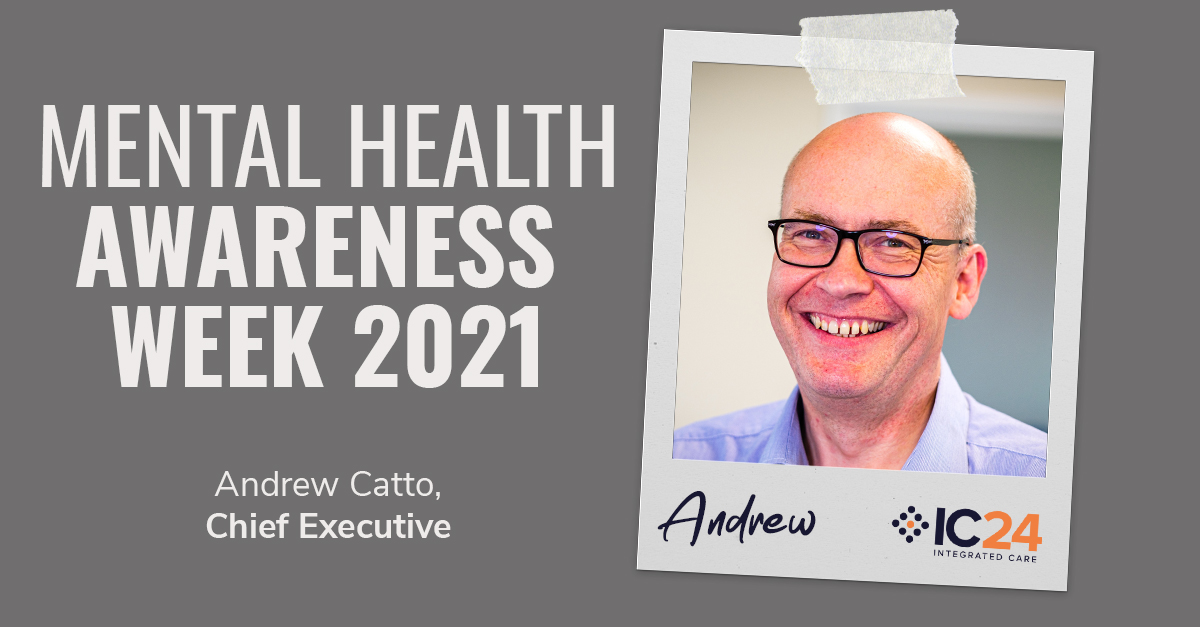Mental Health Awareness Week 2021
For Mental Health Awareness Week, Dr Andrew Catto, our Chief Executive at IC24, discusses why mental health awareness is so important.
by Dr Andrew Catto - Chief Executive

Mental Health Awareness Week 2021 - Andrew Catto
Raising awareness of potential mental health issues is part of fostering an inclusive workplace, where people feel able to bring their whole selves to work. Dr Andrew Catto, Chief Executive at IC24, discusses why mental health awareness is so important.
What is Mental Health Awareness Week?
Mental Health Awareness Week is an annual event held by The Mental Health Foundation to raise awareness of mental health issues. It’s an opportunity for people to talk about all aspects of mental health, with a focus on providing help and advice.
Mental health is something that we all possess. When it’s good, we feel that we can cope with whatever life (and work) throws our way, but just as our physical health fluctuates, our mental health goes through ups and downs too.
Why is this year's theme so important?
The theme for this year’s event is ‘Nature’. Spending time in green spaces or bringing nature into your everyday life can benefit both our mental and physical wellbeing. During the various lockdowns, access to nature has been one of the main ways people have supported their mental health. We also know that protecting the environment is a social justice issue that has huge implications on our collective mental health, both now and for future generations.
How can you get involved?
Awareness of mental health is increasing, but we need to continue to raise awareness of the challenges that mental health issues can cause. You may be wondering whether one person’s efforts can really make a difference, and the answer is “Yes – it can!”
Every conversation you engage in about the importance of mental health creates a ripple effect that reaches people in your circle and far beyond it. Here’s some suggestions to help you:
Take a break – None of us are superhumans. We all get tired or overwhelmed when things feel or don’t go to plan. If you, a colleague, or loved one are feeling this way, a change of scenery can really help your mental health. It could be a five-minute break from what you’re doing, a half-hour walk at lunch or giving yourself some ‘me time’.
Encourage people to see the connection between physical and mental health – Mental health doesn’t exist in isolation from your physical health, so looking after both can be one of the most effective ways to maintain your entire wellbeing. Encouraging people to see the connection between physical and mental health can be a much-needed reminder, as we’re all guilty of forgetting this link when consumed by modern-day living.
Open up about your experiences – Sharing your story about your own struggles with mental health could be the encouragement that someone needs to open up about theirs. It can be reassuring to hear that someone else has experienced similar struggles and is now able to tell their story.
What you can do as an organisation
Talking about mental health at work can help to create an open and honest culture. IC24 have always had a strong focus on people’s wellbeing, but the unique challenges we’ve faced since the pandemic has given us an increased energy to keep mental health at the top of our agenda. Here’s just a couple of ways we’ve put wellbeing at the core of our organisation:
Trauma Risk Management (TRiM) – During the first waves of the pandemic, our contact centre colleagues experienced one of the most extraordinary periods of their careers, working tirelessly on the frontline to care for patients. We implemented the Trauma Risk Management (TRiM) process in our contact centres to support those who are exposed to traumatic situations. The system allows peers to understand reactions to traumatic incidents and to conduct structured risk assessments, aiming to identify people needing early referral to qualified medical support.
‘Wellbeing Wednesdays’ – During the first lockdown, we were conscious of the problems our people would be facing, including childcare, WFH and self-isolating. Over the course of 2020, we shared weekly guidance and information on various areas of wellbeing in the form of ‘Wellbeing Wednesdays’.
Further advice and support
Whether you’re supporting someone with a mental health problem or have one yourself, having the right information is vital. Please see the below resources for more information and help:
MIND
Mental Health Foundation